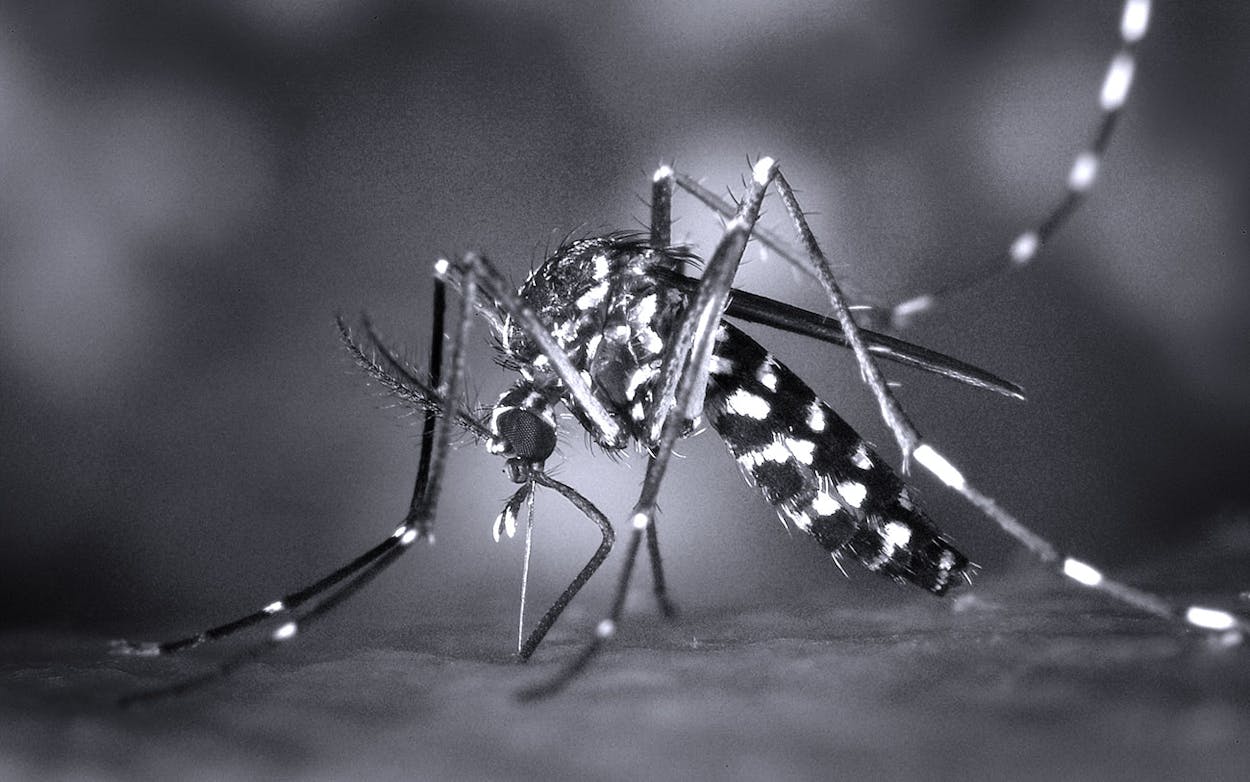As floodwater begins to recede, a familiar menace is set to rise and swarm Houston: mosquitoes.
Local officials are already dealing with health challenges related to Hurricane Harvey, such as complications from exposure to contaminated water or toxic mold. Could the coming surge of mosquitoes bring increased risks of mosquito-borne illnesses? The blood-sucking insects serve as vectors, or carriers, for several viruses capable of causing human disease, including Zika—which grabbed headlines last year for its link to birth defects—and West Nile virus, which has been established in Texas since 2002. The state saw 370 West Nile infections during 2016, and mosquitoes and humans have already tested positive for the virus in 2017.
But according to Dr. Mustapha Debboun, head of Harris County’s mosquito control efforts, the risk of mosquito-borne illnesses immediately following natural disasters like Harvey isn’t as great as many suspect.
Houston’s existing mosquito population was swept away, along with their eggs, by Harvey’s historic rains and flooding. But mosquitoes thrive wherever they can lay their eggs in standing water—and with the city covered in it, it won’t be long before the bugs are back in a big way. Yet even this doesn’t necessarily make an outbreak likely. West Nile and other viruses aren’t transmitted between mosquitoes. Each infected insect must first feed off of an infected host. For West Nile that long-term host is birds, and Harvey blew those away too.
But both will soon return, and Houstonians and experts like Debboun know they might see Christmas lights before mosquito season is over.
Dr. Peter Hotez, dean of the National School of Tropical Medicine at Baylor College of Medicine in Houston, believes the aftermath of Hurricane Katrina can give local health officials an idea of what to expect in the coming months. In 2005, following Katrina, West Nile all but disappeared from New Orleans, even after mosquitoes returned. But a year later in 2006, cases unexpectedly doubled compared to pre-Katrina years.
“What needs to be done is long-term surveillance beyond this transmission season,” Hotez explained. “Given all the West Nile we’ve already seen in Texas in recent years, this means we’re really going to have to keep our eyes on it in the coming months. We can’t really say we’re out of the woods until much later.”
Fortunately, most of Harris County’s mosquito-control equipment made it through the storm unscathed. “We’re functional, we’re operational, and we will do our job. We’re ready,” Debboun assured.
Starting next week, Debboun’s teams will be out literally counting mosquitoes. In areas with high numbers, they’ll spray and treat standing water with pesticides. Typically, they’d wait for lab tests to confirm West Nile or other viruses before spraying, but Debboun said the county will prioritize population control during the oncoming mosquito blitz. Residents are also expected to do their part, emptying out standing water on their properties and keeping mountains of debris from becoming new mosquito breeding grounds as they rebuild. A healthy dose of DEET won’t hurt either.
Of course, if Harvey has taught people anything, it’s that past experiences can’t always prepare them for the future, and Houston may still see elevated risks. “New Orleans had a similar demographic profile, similar geography and climate, and a similar set of risk factors,” Hotez said. “Of course Houston is bigger, and has a larger population, so if anything it will only exacerbate the risks seen after Katrina.”
Debboun shares this sense of caution. He knows mosquitoes better than most, and is quick to note there are no straightforward answers when it comes to controlling a pest so well-adapted to this landscape. “It’s not easy. It’s not simple,” he said. “If nature was that simple, we would not be talking about this right now.”
It’s safe to bet that Houstonians are talking about mosquitoes right now, in colorful language punctuated by slapping noises. All the while, officials across the Gulf Coast are on alert to keep West Nile, Zika, and other viruses—if not those itchy red bumps—at bay. Restoring health to their cities will be hard enough as it is.
Joe Hanson, Ph.D. is a biologist and science writer from Austin. He is the creator and host of the award-winning science education show It’s Okay To Be Smart from PBS Digital Studios.






